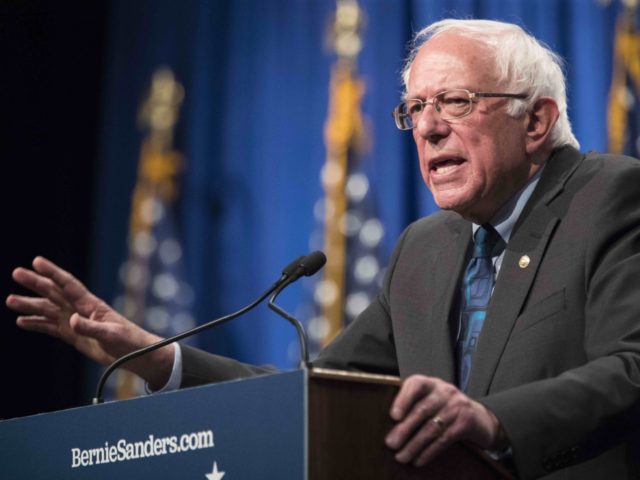Sen. Bernie Sanders (I-VT) gave an passionate address on Wednesday at George Washington University in Washington, DC, in defense of “democratic socialism” — but spent most of his energy attacking its critics.
The speech was intended to rally left-wing voters as conservative critics have pounced on the increasing prominence of “democratic socialists” within the Democratic Party — and as Sanders faces a stronger challenge from Sen. Elizabeth Warren for second place in the presidential primary (both are still polling behind former vice president Joe Biden).
Yet Sanders struggled to argue that “democratic socialism” would actually work — after a century of failure, and with the ongoing collapse of Venezuela making daily headlines.
Sanders (via Vox) began by defining the problem facing America as “a growing movement towards oligarchy and authoritarianism,” which he said meant “a small number of incredibly wealthy and powerful billionaires own and control a significant part of the economy and exert enormous influence over the political life of our country.”
Though economic data show that blue-collar wages are rising faster than white-collar wages under President Donald Trump, Sanders described an increasingly unequal society.
What America needed, Sanders argued, was a revival of the policies and priorities of President Franklin Delano Roosevelt, who gave America the “New Deal” and a broad array of social programs, many of which are still popular.
Sanders declared:
Over eighty years ago Franklin Delano Roosevelt helped create a government that made transformative progress in protecting the needs of working families. Today, in the second decade of the 21st century, we must take up the unfinished business of the New Deal and carry it to completion.
This is the unfinished business of the Democratic Party and the vision we must accomplish.
…
Now, we must take the next step forward and guarantee every man, woman and child in our country basic economic rights – the right to quality health care, the right to as much education as one needs to succeed in our society, the right to a good job that pays a living wage, the right to affordable housing, the right to a secure retirement, and the right to live in a clean environment.
Sanders breezed past the question of how these rights would be guaranteed, or the empirical evidence from around the world showing that socialist policies usually fail, and often seem to guarantee that such “rights” are never achieved.
He briefly praised President Lyndon Johnson’s effort to extend the New Deal into the “Great Society” — but did not deal with the fact that many Great Society programs failed. That failure, in turn, fueled the rise of Ronald Reagan and the revival of a conservative movement that championed economic liberty and freed millions from communism’s grip.
Instead, Sanders focused on critics of “democratic socialism,” pointing out that many Democratic Party policies throughout the years have been described by critics as “socialist.” He added that conservative critics of socialism “absolutely love corporate socialism that enriches Trump and other billionaires.”
“True freedom,” Sanders argued, was not freedom from government coercion, but the ability to fulfill basic economic needs.
As such, Sanders proposed “a 21st Century Economic Bill of Rights”:
- The right to a decent job that pays a living wage
- The right to quality health care
- The right to a complete education
- The right to affordable housing
- The right to a clean environment
- The right to a secure retirement
The trouble for “democratic socialism” is that while the free market has provided these “rights” unequally, at least it has provided them — and provided them widely.
Socialism has done the opposite. The few examples of successful socialist policies tend to come from countries in which the United States generously subsidizes national defense — and even in those places, socialist policies have failed to prevent high unemployment, declining public services, and social unrest.
Ultimately, Sanders’s argument for “democratic socialism” depends on sleight of hand: he re-defines popular government programs as “socialist,” while ignoring the failures of other government programs (not just “socialist” ones).
And Sanders avoids entirely the question of whether “socialism” can ever actually be “democratic” — when the evidence of history shows that central economic planning always overrides democratic freedoms.
Whether he wins or loses, Sanders’s contribution to the 2020 Democratic presidential primary is beyond doubt. His embrace of “democratic socialism” has inspired his party to take up socialist policies like his own “Medicare for All,” and like the “Green New Deal” proposed by 2016 Sanders supporter Rep. Alexandria Ocasio-Cortez (D-NY).
But whether that ideological legacy is a boon, or a burden, to the party as a whole remains to be seen.
Joel B. Pollak is Senior Editor-at-Large at Breitbart News. He is a winner of the 2018 Robert Novak Journalism Alumni Fellowship. He is also the co-author of How Trump Won: The Inside Story of a Revolution, which is available from Regnery. Follow him on Twitter at @joelpollak.

COMMENTS
Please let us know if you're having issues with commenting.